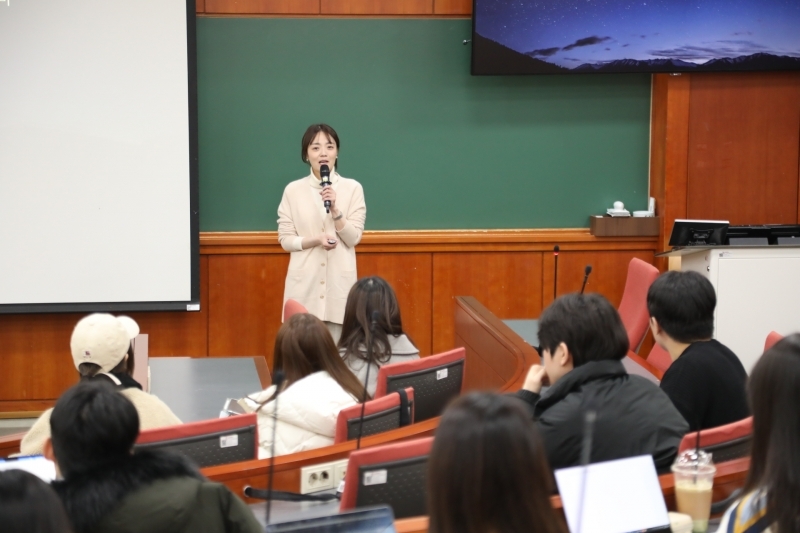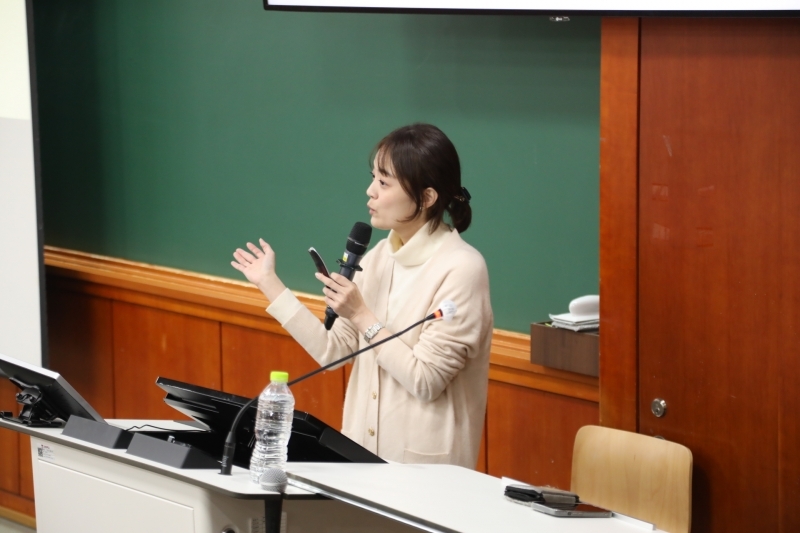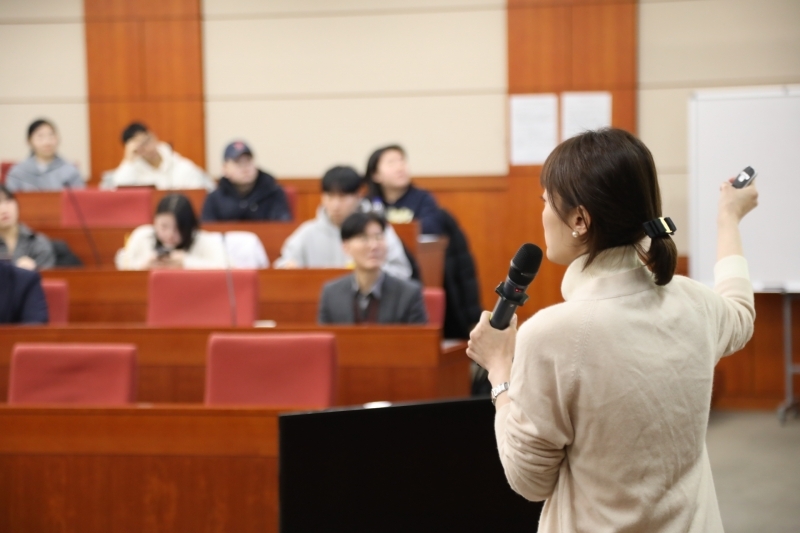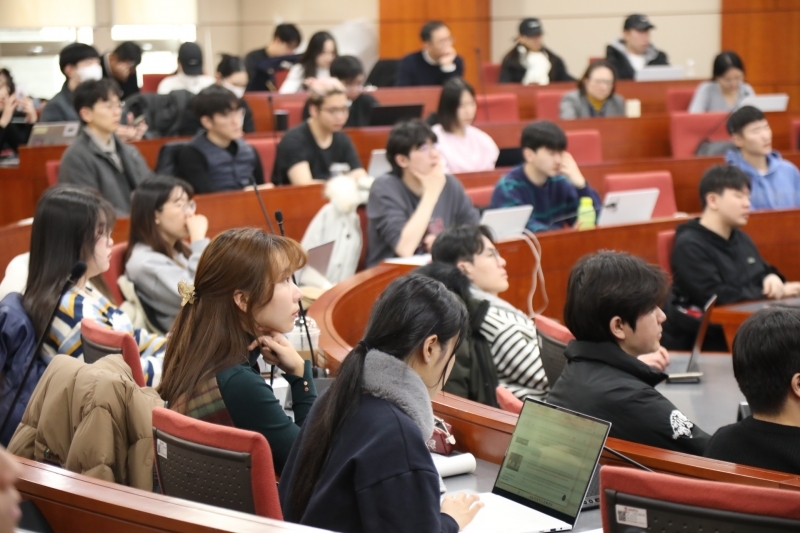News
KUBS News
Predicting Demand and Persuading with AI,” DTB Colloquium Successfully Finished
2024.03.13 Views 2332 국제실
Predicting Demand and Persuading with AI,” DTB Colloquium Successfully Finished
The KUBS (Dean=Sang Yong Kim) Center for Digital Transformation & Business (Center Head=Kyung Sam Park, known as CDTB) organized the DTB Colloquium on January 10 (Friday) at LG-POSCO Hall Room 432. The event featured a lecture by Dr. Hyangmi Kim, an AI researcher at LG. Prior to the commencement of the lecture, Professor Park expressed gratitude to the students who attended despite their busy schedules and extended a warm welcome. He remarked, “Given the early exposure to the significant role and impact of AI, many students are curious about the application of AI in business and the trends in generative AI. I believe today’s lecture, based on practical experience, will be greatly beneficial to their studies.”
Dr. Kim obtained her Ph.D. from the KUBS Graduate School and completed her doctoral studies in Medical Engineering at Hanyang University. Over the past 15 years, she has contributed to various research areas including B2B marketing, education, and medical statistics through roles such as university lecturer, KT Economic Management Research Institute, secretary’s office, and Big Data Business Support Team. From 2019 to 2020, she served as the team leader of the AI Academy at LG Science Park, leading the cultivation of domestic AI talent and AI research. From 2020 to the present, she has been working as an AI researcher at LG, spearheading various projects aimed at advancing AI technologies and their business applications.

The colloquium had a theme of “How AI Can Help Your Business?” The first session, from 2:00 to 3:00 PM, focused on “Utilization of AI Models in Business,” while the second session, from 3:00 to 4:00 PM, delved into “Trends and Opportunities in Generative AI.” During the lecture, Dr. Kim explained △ the application areas of AI technology and companies’ investment in AI △ the development of AI technology △ the potential of generative AI, and efforts to overcome the limitations of AI technology.
Dr. Kim began the lecture by introducing the utilization of AI technology in various industries within the domestic business sector and the trends in corporate AI investments. In the medical field, AI plays a crucial role in patient treatment by being applied to medical image analysis, diagnostic support, and cancer prediction. Particularly, the use of AI in medical image analysis enables rapid and accurate diagnosis. In the manufacturing industry, AI is utilized for defect detection, quality improvement in production processes, and demand forecasting, enhancing production efficiency and reducing costs. Moreover, in the financial sector, AI is employed for investment portfolio management, risk analysis, and detection of financial fraud, providing more efficient financial services. With AI-based demand prediction, financial institutions can make more accurate decisions. AI is also utilized in life sciences and pharmaceutical development for molecule discovery, chemical synthesis, and anti-cancer vaccine development, enabling faster and more efficient research and development. Dr. Kim emphasized, “Korean companies are innovating in various fields through AI technology,” and projected that “the positive effects of AI will continue to enhance collaboration with humans across a wider range of fields.”

The discussion then moved on to the development of AI technology and the potential of generative AI. Generative AI utilizes unstructured deep learning models to generate content based on user input, representing a type of artificial intelligence technology that actively generates results according to the user’s specific requirements. This type of AI is gaining attention for predicting future technology trends and performing creative tasks. Dr. Kim explained, “Generative AI possesses characteristics that mimic the structure of the human brain, enabling large-scale computations and self-learning, indicating significantly superior thinking and learning abilities compared to conventional AI.” She added, “Due to these characteristics, generative AI provides experiences and creativity much closer to human levels.”

Over the past decade, major tech companies in the United States have significantly increased their investment in generative AI. This investment has led to a rapid increase in the pace of technological development, and major Korean companies also possess superlative AI capabilities. Dr. Kim stated, “This will be an important driving force for Korea to be recognized as a future technology leader.”
Towards the end of the lecture, there was a discussion on the importance of recognizing the limitations of AI technology and efforts to overcome them. Dr. Kim mentioned the limitations of generative AI, such as its inability to think in contextual terms and copyright issues. She emphasized, “As generative AI emerges, the importance of data reliability and expertise is greatly increasing.” She continued, “Generative AI is rapidly evolving into a field that provides tailored models for each industry. As a researcher in business administration, there is still ongoing consideration of whether it is possible to bring differentiated research points regarding this.” Finally, Dr. Kim concluded, “In order for AI and humans to coexist healthily, it is important for practitioners handling AI to enhance their expertise and increase the reliability of data. We have now entered a phase where AI is seamlessly integrated into education and business, convincing us naturally, rather than studying AI technology separately.”



